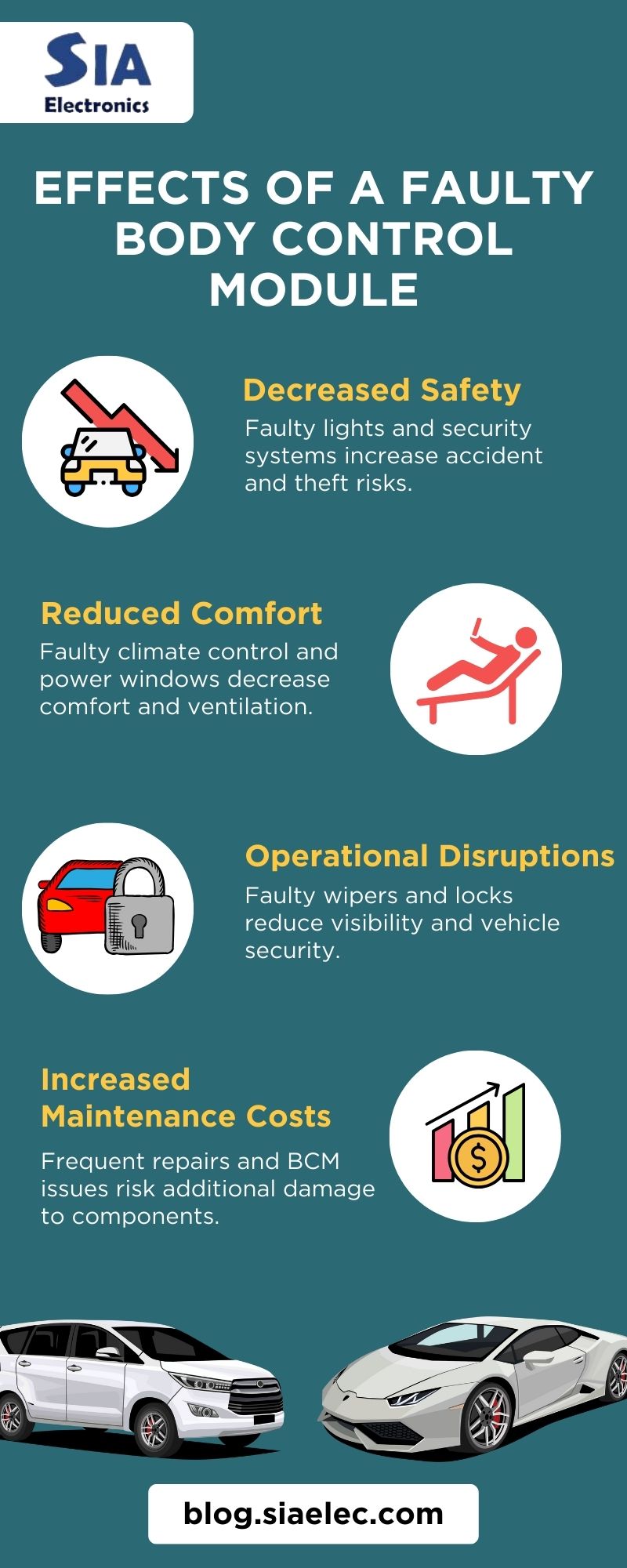Introduction
The Body Control Module (BCM) plays a crucial role in managing various electrical functions in your vehicle. As vehicles become more technologically advanced, the BCM’s importance grows, controlling everything from lighting systems to door locks. However, like any electronic component, BCMs can fail over time, leading to a range of symptoms that can impact your vehicle's performance and safety. This blog will delve into what a BCM is, the symptoms of a bad Body Control Module, and the effects on vehicle performance, as well as provide guidance on what steps to take if you suspect a malfunction. Additionally, we'll highlight top repair services for addressing BCM issues.
Table of Contents
What is a Body Control Module?
The Body Control Module (BCM) is an electronic component responsible for managing various electrical systems in a vehicle. It serves as the central hub for controlling and monitoring functions such as:
- Lighting Systems: Headlights, taillights, and interior lights.
- Power Windows and Door Locks: Operation and security.
- Climate Control: Air conditioning and heating systems.
- Wipers and Washers: Windshield wipers and fluid systems.
- Security Systems: Alarm and immobilizer functions.
In essence, the BCM ensures seamless operation and integration of these features, enhancing both convenience and safety for the driver and passengers.
Symptoms of a Bad Body Control Module
A malfunctioning BCM can manifest through various symptoms. Recognizing these early signs is crucial to addressing the issue before it escalates.
- Electrical Failures
- Erratic Lighting: Flickering or non-functional headlights, taillights, or interior lights.
- Inconsistent Power Windows: Windows that move slowly or fail to operate.
- Problems with Locks and Security
- Door Lock Issues: Inconsistent or non-responsive door locks.
- Security System Failures: Alarm triggers or immobilizer malfunctions.
- Climate Control Malfunctions
- Unresponsive HVAC Controls: Air conditioning or heating systems that do not respond to controls.
- Wiper and Washer Issues
- Inoperative Wipers: Wipers that do not activate or operate intermittently.
- Washer Fluid Problems: Washer fluid that does not dispense properly.
- Dashboard Warnings
- Illuminated Warning Lights: Persistent warning lights on the dashboard related to electrical systems.
- Unusual Behavior
- Random Resets: Sudden resets or reboots of electronic systems.
- Intermittent Functionality: Functions that work intermittently or unpredictably.
Effects of a Faulty Body Control Module on Vehicle Performance
A faulty BCM can have several detrimental effects on vehicle performance, potentially compromising safety and convenience.
- Decreased Safety
- Impaired Lighting: Reduced visibility due to faulty headlights or taillights, increasing the risk of accidents.
- Malfunctioning Security Systems: Increased vulnerability to theft due to issues with alarms and immobilizers.
- Reduced Comfort
- Climate Control Issues: Discomfort from malfunctioning heating and cooling systems.
- Inoperative Power Windows: Reduced ability to control ventilation and access.
- Operational Disruptions
- Faulty Wipers: Limited visibility during adverse weather conditions.
- Erratic Locks: Difficulty in securing the vehicle, impacting both convenience and security.
- Increased Maintenance Costs
- Frequent Repairs: The need for repeated repairs or replacements of affected systems.
- Potential for Additional Damage: Ongoing BCM issues may lead to further damage to associated components.
What Should I Do If I Suspect My Body Control Module is Failing?
If you suspect that your BCM is failing, it is crucial to take prompt action to prevent further issues.
- Diagnose the Issue
- Check for Symptoms: Monitor the symptoms mentioned above to confirm BCM-related issues.
- Use Diagnostic Tools: Employ OBD-II scanners to identify BCM-related error codes.
- Consult a Professional
- Seek Expert Diagnosis: Visit a qualified mechanic or automotive electrician for a comprehensive diagnosis.
- Follow Recommendations: Adhere to the professional’s recommendations for repair or replacement.
- Consider Repair or Replacement
- Repair Options: In some cases, repairing the existing BCM may be feasible.
- Replacement Options: If repair is not viable, replacing the BCM with a new or re-manufactured unit may be necessary.
Who Provides the Best Body Control Module Repair Services?
When it comes to BCM repair and re-manufacturing, choosing a reliable service provider is essential for ensuring high-quality repairs and replacements.
SIA Electronics
- Industry Expertise: With over 20 years of experience, SIA Electronics is a leading provider in the re-manufacturing of automotive electronic control modules, including BCMs.
- Comprehensive Services: Offers repair and re-manufacturing for various automotive electronics, including mass air flow sensors and anti-lock brake computers.
- Quality Assurance: Known for high standards and reliable service, ensuring optimal performance of your vehicle’s electronic systems.
Conclusion
The Body Control Module is a vital component in modern vehicles, responsible for managing a wide array of electrical functions. Recognizing the symptoms of a bad BCM and understanding its impact on vehicle performance can help in addressing issues promptly. Regular diagnostics and maintenance are key to ensuring the BCM and related systems function correctly. For top-notch repair and re-manufacturing services, SIA Electronics stands out as a trusted provider, offering over two decades of expertise in automotive electronics.
FAQs on
What Are the Symptoms of a Bad Body Control Module?
-
1. What causes a Body Control Module to fail?
Ans.
A Body Control Module (BCM) can fail due to a variety of reasons, including electrical faults, exposure to moisture, physical damage, or wear and tear over time. Issues with wiring or connections can also contribute to BCM failure.
-
2. Can a faulty Body Control Module cause my car to not start?
Ans.
Yes, a malfunctioning BCM can cause starting issues. Since the BCM controls critical functions such as the ignition system and security system, problems with it may prevent the car from starting or cause intermittent starting issues.
-
3. How can I prevent problems with my Body Control Module?
Ans.
Regular maintenance of your vehicle's electrical systems can help prevent BCM problems. Ensure that all electrical components are functioning correctly, avoid exposure to moisture, and address any warning lights or electrical issues promptly to reduce the risk of BCM failure.
-
4. Is it possible to repair a Body Control Module, or does it need to be replaced?
Ans.
Depending on the nature of the malfunction, a Body Control Module can often be repaired if the issues are minor or related to specific components. However, if the BCM is severely damaged or has extensive faults, replacement with a new or re-manufactured unit may be necessary.
-
5. How much does it cost to repair or replace a Body Control Module?
Ans.
The cost of repairing or replacing a BCM can vary widely based on the extent of the damage and the make and model of the vehicle. Repair costs typically range from $100 to $500, while replacement costs can be between $300 and $1,200, including parts and labor.
-
6. Can a malfunctioning Body Control Module affect my vehicle’s safety features?
Ans.
Yes, a malfunctioning BCM can impact various safety features of your vehicle, including lighting systems, security alarms, and power windows. This can reduce visibility, impair the security system, and affect overall vehicle safety. It’s important to address BCM issues promptly to ensure all safety features remain operational.



